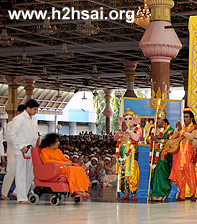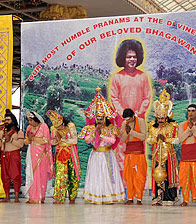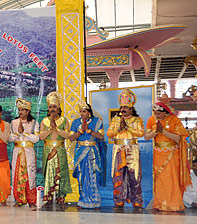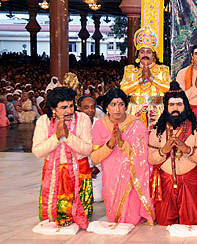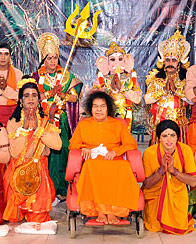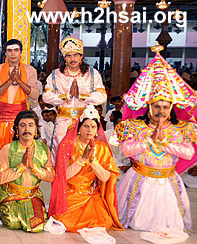February 7, 2010 – Programme by Devotees from Ooty and Nilgris
|
The devotees from Ooty and the Nilgiris hills were in Puttaparthi in the first week of February and on February 7 Swami asked them to present their programme before Him. Bhagavan it seems has a soft corner for these village folk from the hills. Every year, they make their pilgrimage and Swami blesses them abundantly.
Their programmes might not exactly stand the critical test for theatrics and dialogues, but in the realm of devotion and feelings, they are past compare as one can gaze from Swami's response to them year after year. In 2010, they had come prepared with a full fledged drama entitled, “Satyavan-Savitri”.
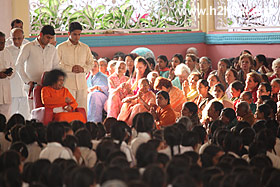 |
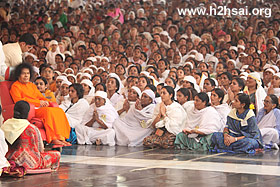 |
The Veda chanting that had begun at 4:00 p.m. which concluded at 5:00 p.m. and a few minutes after that, Swami arrived. The entire cast for the drama came forward and stood in front and the backdrop lived up to its name!
The programme was to be mostly based on the tribal dances of these hill folk and so, as custom demanded, the person wearing the costumes of Lord Ganesha, stood with both hands upraised with his fingers in the modern "V-for-victory" pose. It needed quite some convincing from the organisers to tell him that it was okay and he could stand with folded hands! So much was his involvement in his character and respect for his traditions.
 |
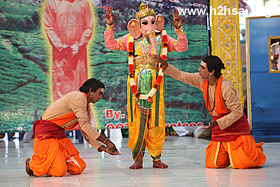 |
Soon, Swami passed by this array of characters and He blessed them. There were two lady characters at the end of the line and He spoke to them, presumably trying to find out who was Savitri! Then He moved around the gents' side and passing by the students, arrived on the stage.
Immediately, He called for the coordinators and told them to begin the programme. The initial offerings were made and Swami so lovingly accepted them. And then with the introductory announcement about the story of Savitri, the drama began.
It was done in the folk-dance style and for those unaccustomed to it, it provoked mild laughter. But the cast were so serious about their roles and the sincerity and effort was seen in their performance. It started with a song in praise of Lord Ganesha. Though the whole programme had been recorded, it had not lost the flavour of tradition as the high pitch voices of the hillfolk singers rented the air. The story then unfolded.
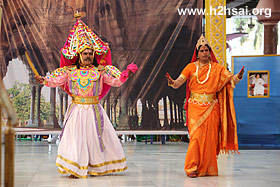 |
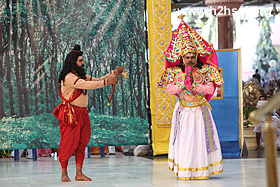 |
The childless king of Madra, Ashwapati, lives ascetically for many years and offers oblations to Sun God Savitr. He wishes to have a son for his lineage. Finally, pleased by the prayers, God Savitr appears and grants him a boon: he will soon have a daughter. The king is joyful at the prospect of a child. She is born and named Savitri in honor of the god.
Savitri is beautiful and pure. She sets out on a pilgrimage and finds Satyavan, the son of a blind king named Dyumatsena, who after he had lost everything including his sight, lives in exile as a forest-dweller. At this point, Swami called one of the students sitting in front and asked him what language the drama was being performed.
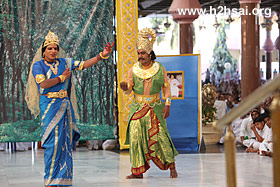 |
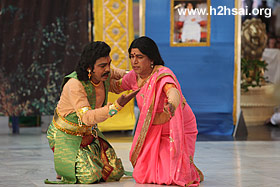 |
The student seemed dazed and Swami Himself answered saying that it was in the 'Badaga' language. (The Badaga language is a southern Dravidian language, a branch of Tamil-Kannada spoken by approximately 400,000 people, the Badagas, in the Nilgiri Hills in Southern India.)
Savitri returns to find her father speaking with Sage Narada who announces that Savitri has made a bad choice: although perfect in every way, Satyavan is destined to die one year from that day. Savitri insists that she will choose her husband but once. Savitri and Satyavan are married, and she goes to live in the forest.
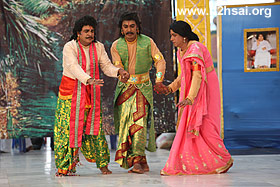 |
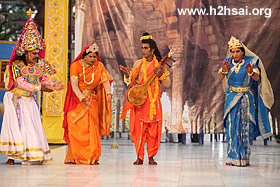 |
The "forest-dweller" Savitri, with her mere appearance seemed to move Swami. Bhagavan looked at her and told a student nearby, "That is Savitri!" Swami became quite emotional and from then on, it was complete involvement. The drama moved on.
Three days before the foreseen death of Satyavan, Savitri takes a vow of fasting and vigil. On the D-Day while Satyavan is splitting wood, he suddenly becomes weak and lays his head in Savitri’s lap. Yama himself, the Death, comes to claim the soul of Satyavan. Savitri follows Yama as he carries the soul away.
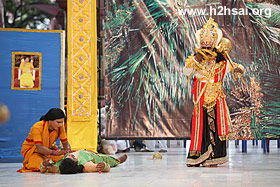 |
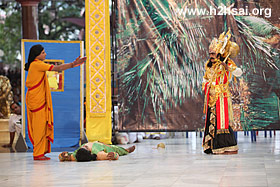 |
At this point, the organisers made an interesting change. The traditional folk singing stopped and what played on the PA system was the audio from the Telugu movie, "Satyavan Savitri." The conversation between Savitri and the Lord of death came alive before everyone. She praises obedience to Dharma, then friendship with the strict, then Yama himself for his just rule, then Yama as King of Dharma, and finally noble conduct with no expectation of return.
Impressed at each speech, Yama praises both the content and style of her words and offers any boon, except the life of Satyavan. She first asks for eyesight and restoration of the kingdom for her father-in-law, then a hundred sons for her father, and then a hundred sons for herself and Satyavan. The last wish creates a dilemma for Yama, as it would indirectly grant the life of Satyavan.
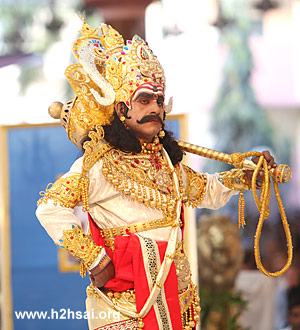 |
However, impressed by Savitri's dedication and purity, he offers one more time for her to choose any boon, but this time omitting "except for the life of Satyavan". Savitri instantly asks for Satyavan to return to life. Yama grants life to Satyavan and blesses Savitri's life with eternal happiness.
Swami was very pleased. He almost shed tears at Savitri's purity and chastity. Seeing Swami was truly an awe-inspiring sight. And there was a message. Swami is so moved with purity and chastity. In a world where infidelity and divorces are on a rise and marriages are unstable, Savitri's life stands as an example for all.
Little wonder it was that the Avatar seemed to shed tears in an intense effort to draw everyone's attention to this inspirational life. It made one feel ashamed at the lengths God was being made to go in order to draw mankind back on the righteous path. It was a charging experience overall. As the drama concluded, Swami said, "Savitri did very well."
He then called out to Savitri and materialized a gold chain for 'her'. Putting it around 'her' neck, He picked up a safari piece and confirmed that it was indeed a male! With a sweet smile, Swami gifted the safari piece. He then gifted each member of the acting troupe with His divine hands.
 |
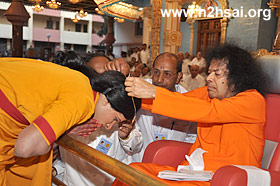 |
Each of them fell at His feet and took namaskar. Swami still did not seem satisfied. He moved down and posed with them for group pictures. He told the cameraman to move to the right and left and cover from both angles so that none would be missed out! Then, going back on the stage, Swami asked for sweets to be distributed to the group as prasadam. After this, He asked them to sing a few bhajans.
Their leader who was seated on the stage joined them as they all led a bhajan on Rama and Krishna. All the students joined in following. After that, Swami asked the students to sing. They too sang a bhajan on Rama and Krishna so that the Ooty devotees rejoice singing about their favourite deities.
|
After that bhajan, Swami asked for aarthi. Blessing everyone after the aarthi, He said, "I am very happy. Everyone acted very well. I will surely come to Ooty." Then He moved back towards the residence. It was almost 6:30 p.m.
Dear reader, how do you like this section? Does it help or inspire you in anyway? Please share your reflections with us by writing to h2h@radiosai.org mentioning your name and country.
Thank you for your time.

